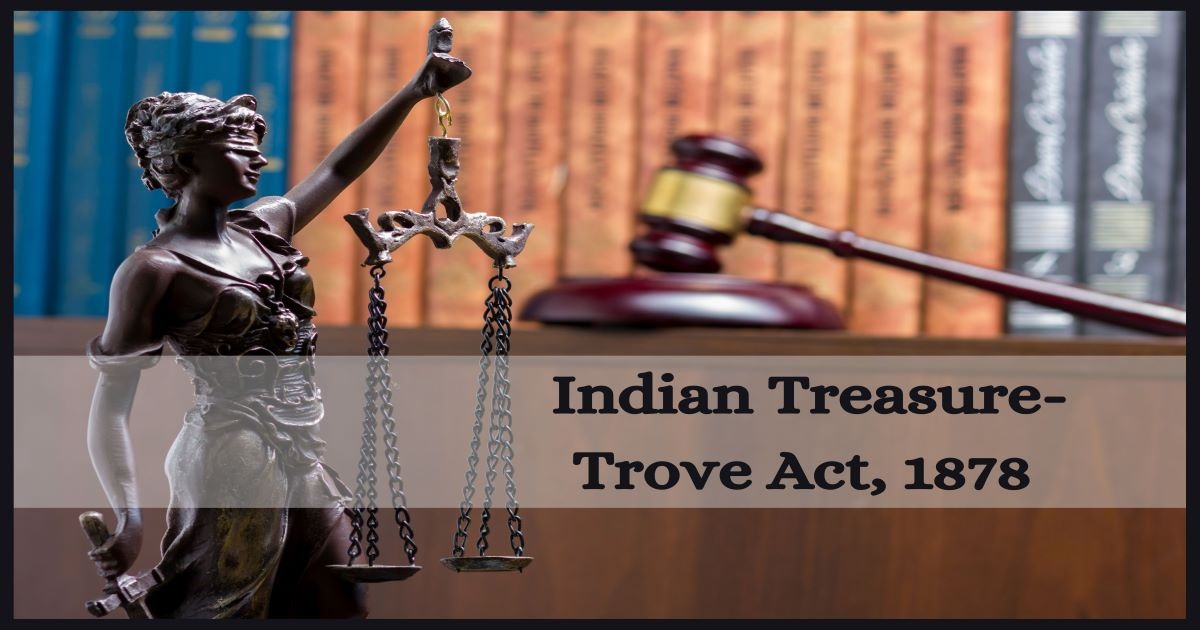Indian Treasure-Trove Act, 1878 was launched to maintain the law associated with the treasures found in the country. According to the law, if you find a treasure, you must inform the government or local senior officials about the same. Hiding the same could land you in big trouble, like paying hefty penalties, or you can even get imprisoned.
Besides these, there are many things that you must know about finding, owning, and hiding treasure. So, if you want to understand the entire Act in the most simplified way, keep reading further!
Table of contents
- An Overview of the Indian Treasure-Trove Act, 1878
- Benefits of the Indian Treasure-Trove Act, 1878
- Indian Treasure-Trove Act, 1878 Sections
- Section 1. Short Title and Extent
- Section 2. Repeal of Enactments
- Section 3. Interpretation Clause
- Section 4. The Finder of Treasure Must Notify the Collector
- Section 5. Notification Demanding Claimants to Appear
- Section 6. Deprivation of Right in Case, the Person Fails to Appear
- Section 7. Matters to be Enquired into and Determined by the Collector
- Section 8. Time to Be Allowed to File the Suit by the Person Who Claims the Treasure
- Section 9. When Treasure Could Be Announced Ownerless
- Section 10. Proceedings Following the Declaration
- Section 11. When No Other Person Claims to be the Owner of the Place, Treasure to be Given to the Finder
- Section 12. When Only One Person Claims and His Claim Doesn’t Conflict with the Finder, Treasure must Be Divided, and Shares must Be Paid to Parties
- Section 13. In Case the Dispute Arises as to the Ownership of the Place, Proceedings Must be Hold
- Section 14. Settlement of Such Dispute
- Section 15. The Division of Treasure
- Section 16. Power to Obscure the Treasure on Behalf of the Government
- Section 17. The Decision of Collector Final, and No Suit to Lie Against Him for Acts Done Bonafide
- Section 18. The Collector can Use the Powers of Civil Court
- Section 19. Authority to Frame Rules
- Section 20. Penalty on Finder If He Fails to Notify, etc.
- Section 21. Penalty on Owner If He Commits Offence under Section 20
An Overview of the Indian Treasure-Trove Act, 1878
Indian Treasure Trove Act, 1878, is designed to amend the law associated with treasures found in India. The Act describes the treasure especially as “anything of any value hidden in the soil” and its value as little as 10 rupees.
The term “Treasure Trove” in the Act is a French word for Treasure found. To know what particulars are covered in this Act, you must have a look through all of its sections.
Benefits of the Indian Treasure-Trove Act, 1878
The Indian Treasure-Trove Act was established to offer the following benefits:
- To avoid any conflict between the owner, the finder of the treasure, and the person claiming the treasure.
- A special committee or authority is set up to look particularly into this matter.
- To ensure the property of India is not used for fraudulent purposes or a particular person’s benefits.
- To preserve the heritage items and the history related to them.
Indian Treasure-Trove Act, 1878 Sections
The Indian Treasure Trove Act, 1878 consists of 21 Sections starting from the meaning of Acts and definition of terms used in the Act to the penalties on treasure finders who fail to notify the government about the same.
To know what each Section in the Act contains, you must read and understand each Section properly. Let’s begin with the first one-
Section 1. Short Title and Extent
This Act will be known as the Indian Treasure-Trove Act, 1878.
Extent- The Act will apply to the entire province of India.
Section 2. Repeal of Enactments
Rep. by the Repealing and Amending Act, 1891 (12 of 1891 ).
Section 3. Interpretation Clause
This Section of the Act mainly defines the meaning of Treasure, Collector, and Owner. Let’s find out what they mean-
- “Treasure” means something that has a value hidden in the soil or anything affixed to it.
- “Collector” will refer to 1) any Revenue Officer who is in independent charge of a district, and 2) any officer nominated by the State Government who performs the Collector’s functions under this Act.
- “Owner” is the person who owns the land where the treasure has been found.
Section 4. The Finder of Treasure Must Notify the Collector
If the finder discover any treasure exceeds the amount or value of ten rupees, he must notify the Collector as soon as possible-
- a) Of the amount and nature or approximate value of such treasure;
- b) Of the place where the treasure was discovered;
- c) The date on which the treasure was found; either deposit the treasure in the nearest government treasury or allow the Collector to make the decision he thinks is fit for and produce it at the place and time set by him.
Section 5. Notification Demanding Claimants to Appear
As per Section 4, if the Collector receives a notice about the treasure, he must inquire (if necessary) and take the following steps as below:
- a) He must publicise a notification in a way that the State Government specifies on this behalf, over time, to the effect that the specific treasure (specify its nature, approximate value, and amount) was found on a specific date (specifying it) in a particular place (specify it). The Collector must also mention the name of every person who claims the treasure or a piece of it.
He must also specify the day and place of the meeting where the people claiming the treasure have to appear either by the agent or personally before the Collector. The day for appearing must not be six months or earlier than four months, later than the date on which the notice was published.
- b) If the Collector finds that the place where the treasure was found was at the date of finding, which is possessed by somebody other than the finder, then the Collector must also send a special notification in writing to that person to the same effect.
Section 6. Deprivation of Right in Case, the Person Fails to Appear
If any person claiming the right to the found treasure or the owner of the place where the treasure was found doesn’t appear on the specified date or time as specified under Section 5, then the person will be forfeited of any such right to get the treasure or a part of it.
Section 7. Matters to be Enquired into and Determined by the Collector
The Collector must ask to produce the treasure before him on the day specified under Section 5, and enquire as to and find out-
- a) The person who found the treasure, the place and the situations under which it was found.
- b) The person and under the situations under which he hid the treasure.
Section 8. Time to Be Allowed to File the Suit by the Person Who Claims the Treasure
In case the Collector makes an enquiry under Section 7 and finds evidence suggesting that the treasure was hidden within one hundred years before the date when it was found, the Collector must pass an order suspending the hearing of the case for such time as he considers it adequate to allow of a lawsuit being filed by the claimant in the Civil Court to prove his right.
This statement described above holds when the person appears as demanded by the said notification and claims such treasure or when another person also claims his right on the treasure.
Section 9. When Treasure Could Be Announced Ownerless
This section describes the situation where the treasure must be declared ownerless. It would be when-
- The Collector doesn’t find any strong reason, upon any such enquiry, to accept that the treasure was hidden, or
- Where a period is defined under Section 8,
- No suit is filed as aforementioned within the said period as the Collector is informed of, or
- In case such lawsuit is filed within the defined period, and
- The plaintiff’s claim is eventually rejected; the Collector in such cases may declare that the treasure should remain ownerless.
Appeal against such declaration: Any person offended or hurt by the declaration made under this Section may file an appeal against the same with the Chief Controlling Revenue- Authority within two months from the date of the declaration.
Every appeal should be final and definitive, subject to such appeal.
Section 10. Proceedings Following the Declaration
Under Section 9, after the declaration regarding the treasure has been made and if the owner and some other person (finder) claim to own that, such treasure must be delivered, according to the rules contained from now on, to the finder. Or it should be split between the finder and the place’s owner where the treasure has been discovered in the way specified here.
Section 11. When No Other Person Claims to be the Owner of the Place, Treasure to be Given to the Finder
A declaration regarding the treasure must be made. In case no individual other than the finder of the treasure appears for the hearing as demanded by the notification publicised under Section 5 or claims the treasure’s share or to be the owner of the place where the treasure was found, the Collector must furnish that treasure to the finder in this case.
Section 12. When Only One Person Claims and His Claim Doesn’t Conflict with the Finder, Treasure must Be Divided, and Shares must Be Paid to Parties
As aforesaid, when the Collector has made the declaration regarding the treasure, and only one person other than the finder of the treasure has so shown up and claimed, and the claim of that person doesn’t conflict with the finder, then the Collector must proceed to divide the treasure between the person claiming so and the finder, according to the following rule that states-
If the person claiming the treasure and the finder disagreed, then in force as to the destruction of the treasure, three-fourths of the treasure must be provided to the finder and the rest of it to the person claiming it.
However, in case the claimant (the person claiming) and the finder entered into any such agreement, the treasure must be disposed of based on the conditions that: in any case, the Collector may, if he find it feasible, rather than dividing any treasure as directed by this Section-
- a) Allot the whole or more than their share of the treasure to either party, on such party paying the amount of money to the Collector for the other party as the Collector, may set as the equivalent of the share of such other party, or of the excess so allotted, as the case may be; or
- b) Sell a portion of or the whole treasure through the public auction and divide the sale profits between both the parties according to the provisions as prescribed in this Section- Provided also, that when the Collector has rejected any claim made under this Act under Section 9 by any individual other than the person claiming to be the owner of the place where the treasure was found or the finder, then such treasure won’t be divided until after the expiration of two months without an appeal having been presented by the person under Section 9 whose claim has been rejected. In another case when the person’s appeal has been presented after his appeal has been dismissed.
If the Collector has divided this section, he must deliver those parts of such treasure or money instead of that to the parties to which they are respectively entitled under such division.
Section 13. In Case the Dispute Arises as to the Ownership of the Place, Proceedings Must be Hold
The Collector must retain the treasure and order to hold the proceeding with a view to the subject matter to be inquired into and determined by a Civil Court, in the following cases-
- a) If two or more people come forward to claim the treasure after the declaration made by the Collector, and
- b) If all of them claim to be the owner of the place where such treasure was discovered, or
- c) If the right of any such person who has claimed and appeared is in dispute with the finder of such treasure.
Section 14. Settlement of Such Dispute
A person who claims the treasure must appear before the Collector within one month from the date of such order. If the person appears, he may file a suit in the Civil Court to obtain a decree stating his right. Moreover, every person and the finder disputing such claim before the Collector in every such suit shall be made defendants.
Section 15. The Division of Treasure
If any such lawsuit is filed and the plaintiff’s claims are eventually established, then according to the rules of Section 12, the Collector shall divide the treasure between him and the finder.
If no lawsuit is filed as mentioned above, or if the plaintiffs’ claims in all such lawsuits have been finally rejected, the Collector must return the treasure to the finder.
Section 16. Power to Obscure the Treasure on Behalf of the Government
The Collector may declare in his handwriting at any time after making a declaration under Section 9 about his intentions behind acquiring the treasure or any defined part of it on behalf of the government. They must make the declaration even before dividing or delivering the treasure and making the payment to the people entitled.
The payment should be the sum equal to the worth of the materials of such treasure or part, combined with one-fifth of its worth. Moreover, the money for the same should be deposited in their treasury to honour such people.
Moreover, such treasures or a part of it shall be considered the government’s property, while the money so deposited must be dealt with, as far as may be, as if it were any kind of treasure or a part of it.
Section 17. The Decision of Collector Final, and No Suit to Lie Against Him for Acts Done Bonafide
No Civil Court can question any act done or decision passed by the Collector under this Act. Furthermore, the Court can’t file any suit or other proceeding against the Collector for anything he did in good faith to exercise the powers at this moment vested.
Section 18. The Collector can Use the Powers of Civil Court
A Collector who enquires anything under this Act may use any power to trial suits (14 of 1882)] vested by the Code of Civil Procedure on a Civil Court.
Section 19. Authority to Frame Rules
The State Government may, over time, create and amend rules with this Act to restrain proceedings hereunder. Such rules shall have the force of law after publication in the Official Gazette.
Section 20. Penalty on Finder If He Fails to Notify, etc.
If a person finds the treasure and is caught doing the following, then the share of such treasure or money instead, to which he would be entitled, shall vest in the government.
- Fails to notify the government or the concerned local official,
- Doesn’t either make the deposit or offer the security, as required by Section 4
- Alter or attempt to alter to hide the identity of such treasure
Moreover, the person shall be punished on conviction before a Magistrate.
Section 21. Penalty on Owner If He Commits Offence under Section 20
In case the owner of the place where the treasure was discovered abets any offence under Section 20 and within the definition of the Indian Penal Code (15 of 1860). The money or the share of such treasure that he will be privileged to shall vest in the government.
Furthermore, the owner shall be punished with a fine or imprisonment or with both, on conviction before a Magistrate.

































